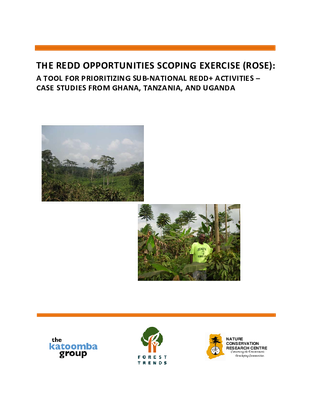REDD Opportunities Scoping Exercise (ROSE): A Tool for Prioritizing Sub-national REDD+ Activities - Case Studies from Ghana, Tanzania, and Uganda
The ROSE was developed by the Katoomba Ecosystem Services Incubator as a tool for classifying and prioritizing potential REDD+ sub-national activities and for assessing critical constraitnts to project development. The ROSE tool was developed and improved during 2009 by conducting case studies in Tanzania, Uganda and Ghana. The tool has two main phases; a 2-3 day expert workshop and an analysis of policy, legal and institutional constraints by a small in-country team following the workshop.This report report by Michael Richards, Rebecca Asare, Sara Namirembe, Jacob Olander and Matt Quinlan explains the ROSE methodology and process, and summarizes the key findings of the case studies.
https://biodiversitylinks.org/projects/completed-projects/translinks/translinks-2010/forest-trends/Report_REDDOpportunitiesScopingExercises.pdf/view
https://biodiversitylinks.org/projects/completed-projects/translinks/translinks-2010/forest-trends/Report_REDDOpportunitiesScopingExercises.pdf/@@download/image/image.png
File
REDD Opportunities Scoping Exercise (ROSE): A Tool for Prioritizing Sub-national REDD+ Activities - Case Studies from Ghana, Tanzania, and Uganda
Author(s):
Michael Richards,
Rebecca Asare,
Sara Namirembe,
Jacob Olander,
Matt Quinlan
Publication Date: 2010
Location: Ghana, Tanzania, and Uganda
DOWNLOAD FILE
The ROSE was developed by the Katoomba Ecosystem Services Incubator as a tool for classifying and prioritizing potential REDD+ sub-national activities and for assessing critical constraitnts to project development. The ROSE tool was developed and improved during 2009 by conducting case studies in Tanzania, Uganda and Ghana. The tool has two main phases; a 2-3 day expert workshop and an analysis of policy, legal and institutional constraints by a small in-country team following the workshop.This report report by Michael Richards, Rebecca Asare, Sara Namirembe, Jacob Olander and Matt Quinlan explains the ROSE methodology and process, and summarizes the key findings of the case studies.



